Have you been worried because you keep spotting a fox in your neighbor’s backyard?
Look again.
That is probably an adorable Shiba Inu!
Unlike foxes that scatter at the sign of any danger, Shiba Inus are bold and courageous dogs that are always ready to face a challenge. Their stubborn attitude forces them to never back down.
TABLE OF CONTENTS
What is a Shiba Inu?
The Shiba Inu was originally bred in Japan to hunt, however these days Shibas are kept as companion dogs.
This purebred has been growing in popularity recently as people have begun to fall in love with their independent nature and goofy antics. These dogs can yodel like there is no tomorrow and will make you laugh with their tight, curly tails and silly smiles.
Although many owners are drawn to their funny personality, a lot of people do not realize how difficult they can be to train and the amount of socialization they require.
This is definitely a breed that is for experienced owners who know that welcoming a pet into your home requires patience and lots of effort.
As for day to day care these dogs are easy to take care of – you will just need to invest a little bit of time into brushing their coats.
- Overview: Purebred.
- Purpose: Companion.
- Weight: 17-23 pounds.
- Size: 13-17 inches.
- Temperament: Strong-willed, goofy and vocal.
Shiba Inu Appearance
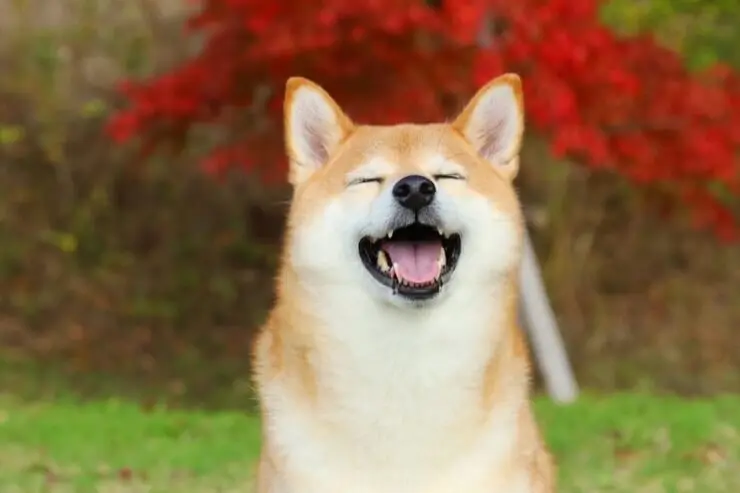
These attentive watchdogs always appear to be alert.
Their pointy ears stick straight up at almost all times to show that their keen ears hear everything that is going on. In addition their squinty eyes make them appear skeptical of everyone they encounter.
These dogs have compact and muscular bodies.
Despite their attempts to look frightening, their goofy smiles can often give them away. These smiley pups are happy when they are with their families or out exercising and their face will show it. Many people mistake this breed for a fox hybrid of some sort. Their agile bodies and the grace with which they move appears very foxlike.
The most characteristic trait of a Shiba Inu is their curled tail. Their tails are tightly coiled, and they rest high up on their back.
Height and Weight
These fearless pups come in a small package.
They are only 13-17 inches tall and weigh 17-23 lbs. Despite their short stature these pups are courageous protectors that will always keep you safe.
Breed Colors and Coat
There are 3 color variations of Shiba Inus: tan, red/orange and black.
Some very special pups will have a sesame colored coat (red fur with black tips on the end).
When these pups have a tan or red coat they can have white markings across their body (known as Urajiro in Japanese).
Their chests, inside of their legs, belly, beneath the tail, muzzle and inside their ears will have this white color in comparison to their light tan or gentle red coat. If your pup has a black coat they will have these same markings but they will be a tan color rather than white.
Inus have dense coats consisting of two layers. The topcoat is rigid and stands upright, while the undercoat is fluffier and creates a lot of shedding.
7 Fun Facts About Shiba Inus
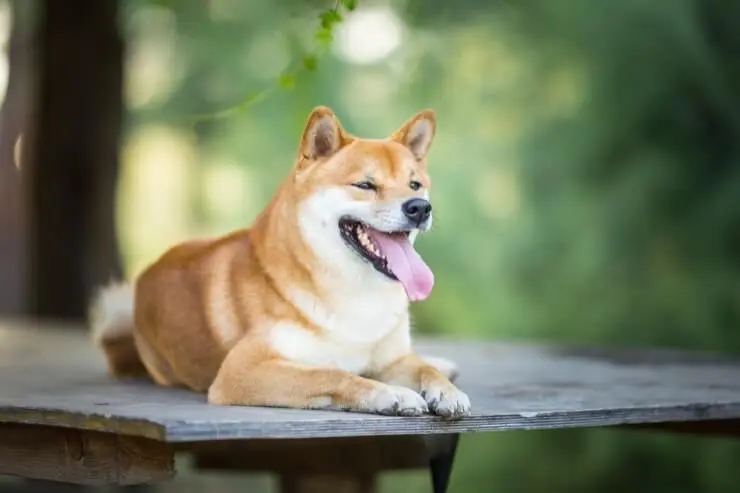
- This breed was initially developed in Japan for hunting purposes. They were versatile hunters, chasing down small prey and birds while also capturing wild boars.
- They were first documented back in 300 BC in Japan.
- Japanese has 6 national dog breeds and the Shiba Inu is the smallest and oldest of all of these breeds.
- Shiba Inus almost went extinct after WWII because so many died in the bombings in Japan.
- These dogs did not make their way to the U.S. until 1954 when an American military family brought one over as a pet.
- They are the most popular companion dog in Japan.
- These courageous pups are also known as the Little Brushwood Dog as “Shiba” is Japanese for brushwood and “Inu” is Japanese for dog.
Shiba Inu Personality and Temperament
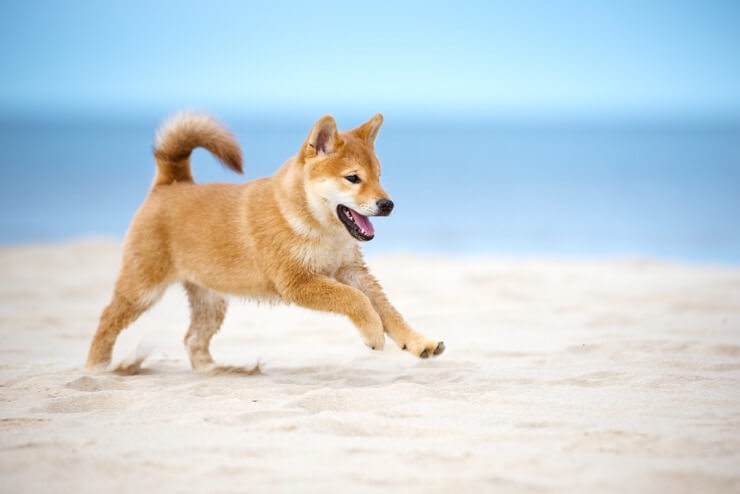
These feisty pups have a bold and courageous personality.
They are excellent watchdogs and will loyally watch over their family for as long as they live. Their families are their entire life and they will do anything to protect them.
However they can be very stubborn.
These independent thinkers are difficult to train and really only do what they want to do. They walk around with their head held high and their tail even higher to show everyone who is really in charge.
Despite their stubborn nature these dogs are extremely affectionate with members of their family. They love to be pet and snuggled with the people that they love and trust. Some Shibas may develop separation anxiety because of their extreme loyalty and desire to protect their families – crate training is a good idea to help treat this anxiety.
Although these dogs are loving with their family members they naturally dislike other people and dogs.
When they meet strangers they are slow to trust and will most likely bark at them to show their dominance. Their territorial nature makes them quick to nip at or bark at other dogs that may invade their personal bubble.
If they are well socialized from an early age then this issue can be corrected.
They need to be comfortable with a variety of people interacting with them to ensure positive relationships with others in the future.
Early socialization is key to their dog training.
Even if these dogs are a bit intimidating to others they are goofy and will always have you laughing. They have a strange yodel sound they like to make. It is a combination of a bark and a scream of some sorts, but it is a sound that will surely crack you up and anyone else in earshot.
Their smiley faces will brighten your day and their playful and energetic personality will always keep you on your toes.
Is The Shiba Inu A Good Family Dog?
These dogs can be a good family dog providing they receive extensive socialization.
They have a tendency to fiercely guard their belongings and may nip at young children who innocently try to pick up their favorite toy.
Shiba Inus are better suited to single dog households with older children who know how to respect their boundaries and be gentle with them.
Caring for Shiba Inus
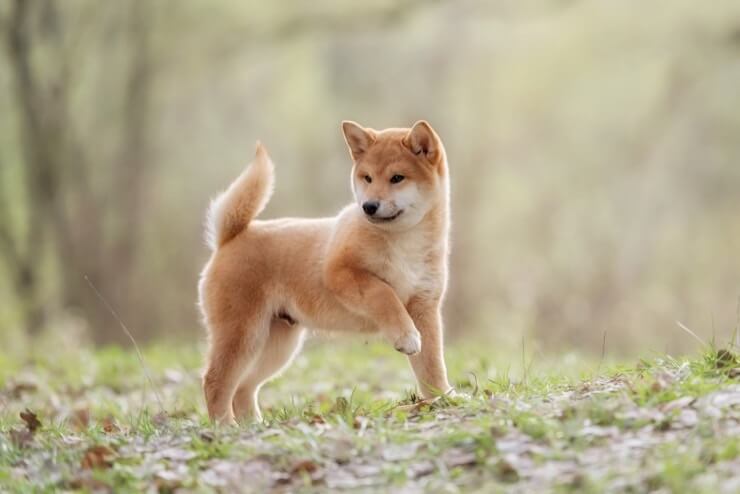
Exercise Requirements
These pups are an active breed that love to exercise.
Thankfully they are not overly hyper and 1-2 walks a day for up to 60 minutes will keep them happy.
Whenever you are walking a Shiba Inu or playing with one, you must have them leashed or in a securely enclosed location. These dogs have strong hunting instincts so if they see an animal, they will not hesitate to take off after them.
This can be a tough task as these hard-headed dogs do not enjoy being confined to a leash or collar. A lot of these pups will desperately try to escape or bite at their leash frequently, so getting them used to their collar and leash when they are a puppy is very important.
They are happy doing whatever exercise is offered to them.
Long walks, runs and hikes will all be fun for them. These fitness buffs just want to be kept busy and will gladly fetch a ball in the yard as well.
- Number of Walks Per Day: 1-2.
- Total Exercise Needed Per Day: 30-60 minutes.
Grooming and Shedding
Although the amount of fur that a Shiba Inu sheds may be daunting to some pet owners, their grooming routine is very low maintenance.
Because of their short fur these dogs will not need to be taken to a professional groomer.
Weekly brushing will keep their fur tidy during most of the year, but during their shedding season you may want to consider daily brushing to minimize the amount of hair that ends up coating your home and clothing.
Shiba Inus are a fairly clean breed and do not get unpleasant smells like other dog breeds, so you will not have to worry about bathing them often. A bath every 3-4 months will be good enough to keep your pup clean and happy.
Like other dog breeds you should check their ears weekly (for any signs of infection) and brush their teeth 2-3 times per week to prevent tartar buildup.
They should have their nails clipped 1-2 times per month, but they truly hate this part of their grooming. They will whine and fuss the entire time so make sure to start clipping their nails at an early age so they are not as fearful.
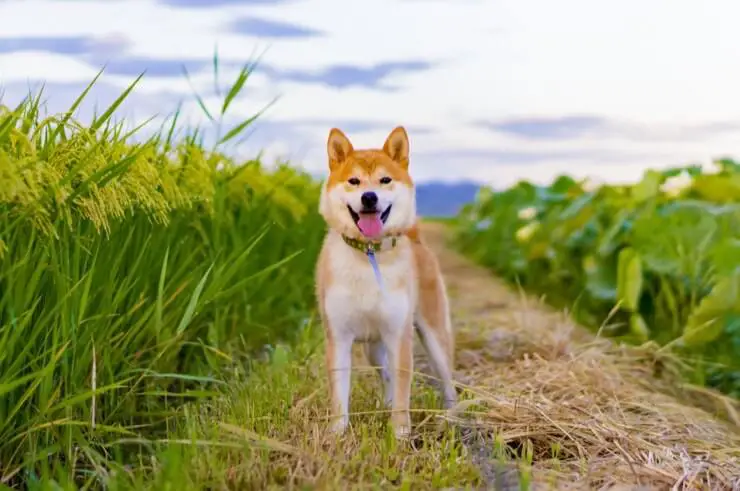
Feeding and Diet
These mighty pups are small so they do not need much food.
You should feed them ½-1½ cups of dog food each day spread out over 2 meals depending on their weight and activity level.
If you are not certain then your veterinarian can help you determine the proper amount of food to feed your Shiba Inus so that they do not become overweight.
Shiba Inus are fairly easy to feed and they do not require a very precise diet. High calorie and high protein diets will help them stay active and low-fat content will help keep any unnecessary weight off their tiny bodies.
If you ever forget to feed your feisty dog they will let you know. They will let out odd yodels and vocalizations until you give them their food!
| Calories Per Day: | Cups of Kibble Per Day: |
|---|---|
| 200-600 | ~½-1½ |
Known Health Problems
Overall these dogs are generally healthy but like any other breed they are not immune to health problems.
- The most common condition these dogs develop is allergies. If you notice dry, itchy patches on your dog’s skin or if they frantically scratch their nose on the carpet a lot, ask your veterinarian for some methods to help control these allergies.
- They may develop hip dysplasia or patellar luxation, conditions that are usually brought on by obesity. If you are dedicated to keeping your dog in a healthy weight range this should not be an issue you have to deal with.
- Eye conditions such as glaucoma and progressive retinal atrophy may occur in this breed in addition to epilepsy and hypothyroidism.
You will not have to worry about them being sick often or developing fatal diseases. Still you should take the precaution of keeping a close eye on your dog and alert your veterinarian to any concerns you may have.
How Long Does A Shiba Inu Live?
They can live for 12-16 years so you can expect to have this furry friend in your life for many years.
How Much Does A Shiba Inu Cost?
A shiba inu costs $1,500 to $2,500 from a breeder.
How to Train a Shiba Inu
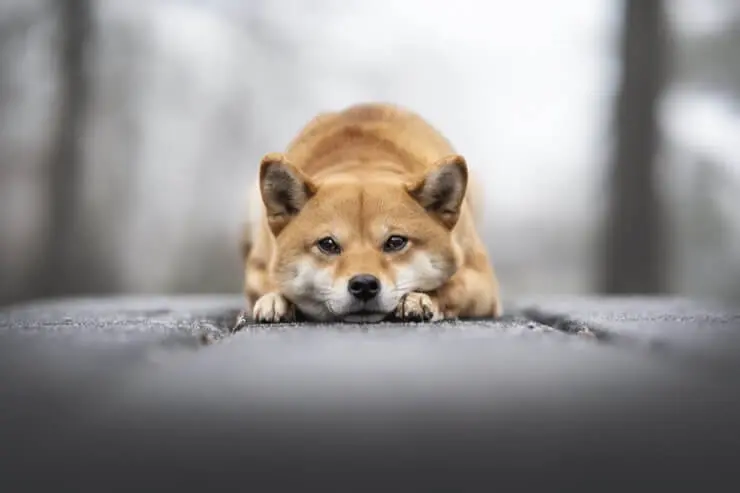
Training dogs like Shiba Inus require an immense amount of patience.
These dogs are stubborn and like to have full authority over what they do – they do not appreciate being told what to do.
The key is to trick your pup into thinking that training is completely on their terms.
Many Shiba Inu owners seek out the help of a personal trainer or enroll their puppy in training classes with other dogs. Professional trainers know how to handle the independent nature of these dogs better than most dog owners.
They are aware that they must be rewarding and use positive reinforcement without letting the dog realize he is following the commands of someone else.
Training classes can also be a great way for your pup to be exposed to other dogs from an early age to reduce future dog aggression.
Although these dogs may have a mind of their own they are very easy to housetrain. They are a very neat and tidy breed and soiling the carpet in the house is almost unheard of for this breed.
It is important to stress that socialization is the most important aspect of training this breed.
Shibas are naturally wary of strangers and often develop dog aggression.
They need to be exposed to many people and dogs of different ages when they are young.
This breed has a high tendency to be aggressive to dogs so it is important to always keep a close eye on them and maybe avoid dog parks unless you are completely confident in your dog’s ability to play nicely.
Shiba Inu puppies are very protective of their belongings (toys, food, bed) and will nip or growl at people who invade their space. This can be extremely problematic if you have young children so you need to catch this early and correct firmly.
They are a very intelligent breed so you will want to keep them occupied. Puzzle toys, food mazes and fun games that you create will keep them mentally stimulated and will protect your home from any chewing.
Buyer’s Guuide
| Pros | Cons |
| Affectionate and loyal with family members. | Stubborn and sometimes difficult to train. |
| Easy to potty train. | Territorial with space and belongings. |
| Does not need lots of exercise each day. | Needs extensive socialization. |
| Minimal grooming requirements. | Vocal and makes various noises often. |
| Very few health concerns. |
Quick Breed Summary Table
| Breed Characteristics | |
| Size: | 13-17 inches |
| Weight: | 17-23lb |
| Lifespan: | 12-16 years |
| Coat: | Thick double coat |
| Color: | Orange/red, black, or tan with white markings |
| Do They Shed: | Yes |
| Temperament: | Loyal, stubborn, sensitive, silly and affectionate |
| Intelligence: | Highly intelligence |
| Socialization: | Needs to be socialized early on or may develop dog aggression |
| Destructive Behavior: | Can become destructive if they develop separation anxiety |
| People Skills: | Wary of strangers and need lots of socialization from an early age |
| Good with Children: | Can be good with older children |
| Activity Levels: | Active but not overly hyper |
Summary
The Shiba Inu can be a challenging breed to train.
They are better suited for experienced dog owners who have the patience and expertise to correctly train and socialize them.
Their goofy personality clashes with their stubbornness and alert watchdog nature.
They are not the most outgoing pups with other people or dogs but they will be loving and loyal to the family members they trust.
Owners of this breed have to work hard at training their dogs, but the end result is an affectionate and goofy companion that will turn heads with their stunning appearance.

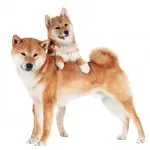
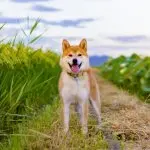
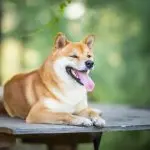
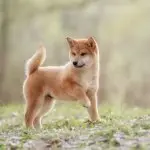
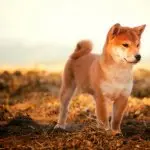
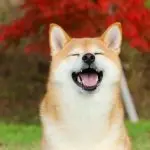
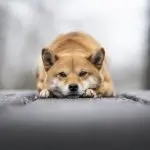
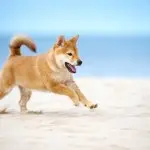
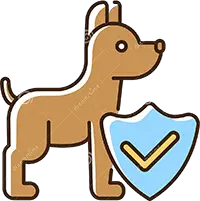
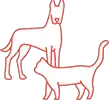
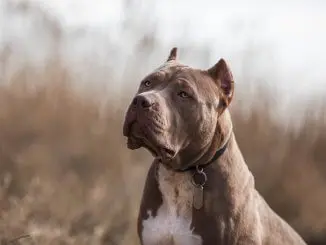
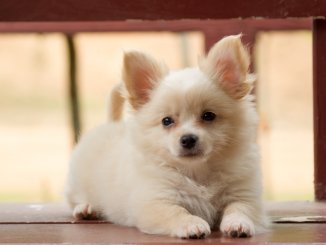
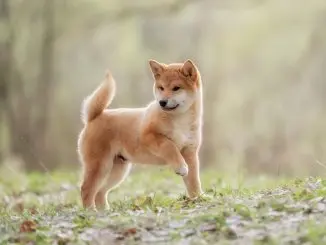
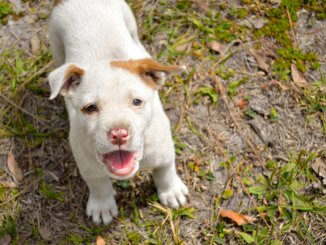
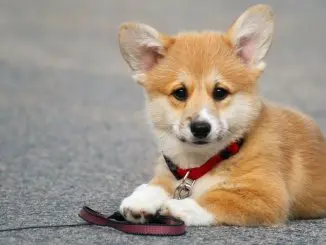
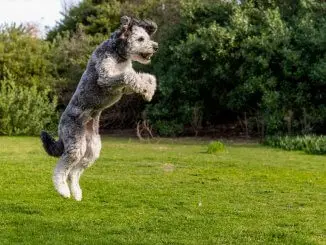
There is another color of shiba….white.. and mine is doesnt bark at all. Just yodels